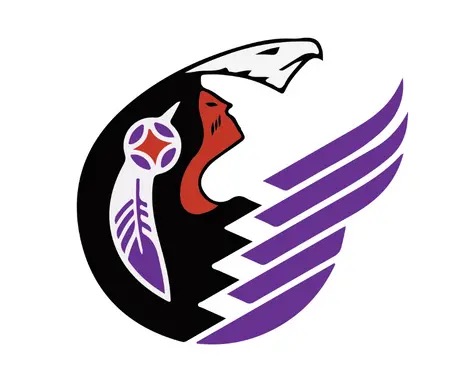About

About the Indigenous Studies Department
Indigenous Studies at McMaster can be traced back to the first Drumbeat conference in 1989, organized by Indigenous students and co-hosted by the Six Nations Confederacy.
The Indigenous Studies Department is home to 11 Faculty Members, the largest number of Indigenous Faculty members in an Indigenous Studies Department at a Canada University, as well as Sessional Faculty from Indigenous Communities and Indigenous administrative staff members.

Indigenous Studies Logo
This logo represents the overall purpose of the Indigenous Studies Program at McMaster University. First Nations artist/designer, Arnold A. Jacobs interprets the logo that he has created for the Program: The overall component of the design is circular to represent unity and a coming together of First Nations.
- The eagle, a spiritual guardian and a symbol of strength and courage, is positioned over a native head that is looking dramatically upward to the future.
- The native wears a feather, not for decoration, but as a symbol for lifting the human spirit. Holding the feather in place is the sacred circle of life, divided into four cycles that affect our lives; they are the four directions, four winds, four seasons, and four colours.
- The lightning ash represents the Power of the Creator of all things. The wings are given this power to lift the eagle to great heights. This power represents the uplifting spirit to the student for higher achievement.
History of Indigenous Studies at McMaster
Indigenous Studies at McMaster can be traced back to the first Drumbeat conference in 1989, organized by Indigenous students and co-hosted by the Six Nations Confederacy.
At the time, Dr. Peter George, Dr. Harvey Feit and Chief Harvey Longboat of the Six Nations Confederacy responded to the request of Dawn Martin-Hill, an undergraduate student, to develop courses to address the needs of Indigenous students. This resulted in the development of the President’s Committee on Native Students and the McMaster First Nations Students Association.
The Indigenous Studies Program supported Chief Longboat’s vision and has initiated the development and accreditation of numerous courses focused on supporting and teaching language, culture and history with an emphasis on Haudenosaunee people.
Timeline
1992: The Indigenous Studies program was established, offering a three-year BA degree.
2014: Indigenous Student Services Department move to Student Affairs, growing out of work and supports provided through the Indigenous Studies Program
2015: Expansion of the Indigenous Studies Program to a four-year Honours degree
2022: The program grew into a department, expanding Indigenous education and research at the university
Indigenous Strategic Directions Plan
In 2021, following a campus-wide collective effort with Indigenous groups, a new Indigenous Strategic Directions Plan was developed by the Indigenous Education Council and McMaster Indigenous Research Institute.
Our Location
Indigenous Studies Department
L.R. Wilson Hall (LRW), 1811
1280 Main Street West
Hamilton, Ontario, Canada
L8S 4M4
Contact Information
General Inquiries:
Phone: 905-525-9140 ext. 23788
Email: indigenous.admin@mcmaster.ca
Office Hours
Monday – Friday:
9:00AM – 4:00PM
Administrative Contacts
Robert Innes Learn More
Chair, Associate Professor
Email: innesr3@mcmaster.ca
Nicole Martin-Enlund
Academic Department Manager
Phone: (905) 525-9140, ext. 26431
Email: martin38@mcmaster.ca
Rita Crespo
Undergraduate Administrative Assistant
Phone: (905) 525-9140, ext. 23788
Email: indigaa@mcmaster.ca
Pat Fraser
Graduate Administrative Assistant
Phone: (905) 525-9140, ext. 20419
Email: isgrad@mcmaster.ca
Associated Programs and Services
Indigenous Student Services Visit the ISS website
Through Indigenous Student Services (ISS), Indigenous instructors can connect with students, allowing them to access a more multi-faceted education. Students have the opportunity to experience workshops, rafting excursions and medicine walks.
Elder in Residence Program Learn more about the Elder in Residence Program
Every year Indigenous Studies hosts an Elder in Residence. The Elder does crafts with students, provides advice and lends a supportive ear to students. If you are pursuing an undergraduate degree in Indigenous Studies or another program on campus you are welcome to participate in the Elder in Residence Program.
Information Box Group
McMaster's Indigenous Education Council Learn more about the IEC
The Indigenous Education Council (IEC) is the primary body that promotes and advocates for advancing Indigenous education at McMaster, championing the needs of Indigenous students, staff and faculty members, and providing advice
